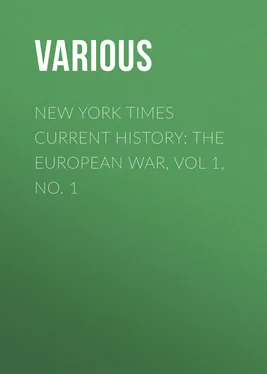Various - New York Times Current History - The European War, Vol 1, No. 1
Здесь есть возможность читать онлайн «Various - New York Times Current History - The European War, Vol 1, No. 1» — ознакомительный отрывок электронной книги совершенно бесплатно, а после прочтения отрывка купить полную версию. В некоторых случаях можно слушать аудио, скачать через торрент в формате fb2 и присутствует краткое содержание. Жанр: foreign_edu, periodic, История, на английском языке. Описание произведения, (предисловие) а так же отзывы посетителей доступны на портале библиотеки ЛибКат.
- Название:New York Times Current History: The European War, Vol 1, No. 1
- Автор:
- Жанр:
- Год:неизвестен
- ISBN:нет данных
- Рейтинг книги:4 / 5. Голосов: 1
-
Избранное:Добавить в избранное
- Отзывы:
-
Ваша оценка:
- 80
- 1
- 2
- 3
- 4
- 5
New York Times Current History: The European War, Vol 1, No. 1: краткое содержание, описание и аннотация
Предлагаем к чтению аннотацию, описание, краткое содержание или предисловие (зависит от того, что написал сам автор книги «New York Times Current History: The European War, Vol 1, No. 1»). Если вы не нашли необходимую информацию о книге — напишите в комментариях, мы постараемся отыскать её.
New York Times Current History: The European War, Vol 1, No. 1 — читать онлайн ознакомительный отрывок
Ниже представлен текст книги, разбитый по страницам. Система сохранения места последней прочитанной страницы, позволяет с удобством читать онлайн бесплатно книгу «New York Times Current History: The European War, Vol 1, No. 1», без необходимости каждый раз заново искать на чём Вы остановились. Поставьте закладку, и сможете в любой момент перейти на страницу, на которой закончили чтение.
Интервал:
Закладка:
In these recommendations I am not forgetting that an effective check on diplomacy is not easy to devise, and that high personal character and class disinterestedness (the latter at present unattainable) on the part of our diplomatists will be as vital as ever. I well know that diplomacy is carried on at present not only by official correspondence meant for possible publication and subject to an inspection which is in some degree a responsible inspection, but by private letters which the King himself has no right to read. I know that even in the United States, where treaties and declarations of war must be made by Parliament, it is nevertheless possible for the President to bring about a situation in which Congress, like our House of Commons in the present instance, has no alternative but to declare war. But though complete security is impracticable, it does not follow that no precautions should be taken, or that a democratic tradition is no safer than a feudal tradition. A far graver doubt is raised by the susceptibility of the masses to war fever, and the appalling danger of a daily deluge of cheap newspapers written by nameless men and women whose scandalously low payment is a guarantee of their ignorance and their servility to the financial department, controlled by a moneyed class which not only curries favour with the military caste for social reasons, but has large direct interests in war as a method of raising the price of money, the only commodity the moneyed class has to sell. But I am quite unable to see that our Junkers are less susceptible to the influence of the Press than the people educated by public elementary schools. On the contrary, our Democrats are more fool-proof than our Plutocrats; and the ravings our Junkers send to the papers for nothing in war time would be dear at a halfpenny a line. Plutocracy makes for war because it offers prizes to Plutocrats: Socialism makes for peace because the interests it serves are international. So, as the Socialist side is the democratic side, we had better democratize our diplomacy if we desire peace.
II
And now as to the question of recruiting. This is pressing, because it is not enough for the Allies to win: we and not Russia must be the decisive factor in the victory, or Germany will not be fairly beaten, and we shall be only rescued proteges of Russia instead of the saviours of Western Europe. We must have the best army in Europe; and we shall not get it under existing arrangements. We are passing out of the first phase of the war fever, in which men flock to the colours by instinct, by romantic desire for adventure, by the determination not, as Wagner put it, "to let their lives be governed by fear of the end," by simple destitution through unemployment, by rancour and pugnacity excited by the inventions of the Press, by a sense of duty inculcated in platform orations which would not stand half an hour's discussion, by the incitements and taunts of elderly non-combatants and maidens with a taste for mischief, and by the verses of poets jumping at the cheapest chance in their underpaid profession. The difficulty begins when all the men susceptible to these inducements are enlisted, and we have to draw on the solid, sceptical, sensible residuum who know the value of their lives and services and liberties, and will not give them except on substantial and honourable conditions. These Ironsides know that it is one thing to fight for your country, and quite another to let your wife and children starve to save our rich idlers from a rise in the supertax. They also know that it is one thing to wipe out the Prussian drill sergeant and snob officer as the enemies of manhood and honour, and another to let that sacred mission be made an excuse for subjecting us to exactly the same tyranny in England. They have not forgotten the "On the knee" episode, nor the floggings in our military prisons, nor the scandalous imprisonment of Tom Mann, nor the warnings as to military law and barrack life contained even in Robert Blatchford's testimony that the army made a man of him.
What the Labour Party Owes to the Army.
And here is where the Labour Party should come in. The Labour Party's business is to abolish the Militarist soldier, who is only a quaint survival of the King's footman (himself a still quainter survival of the medieval baron's retainer), and substitute for him a trained combatant with full civil rights, receiving the Trade Union rate of wages proper to a skilled worker at a dangerous trade. It must co-operate with the Trade Unions in fixing this moral minimum wage for the citizen soldier, and in obtaining for him a guarantee that the wage shall continue until he obtains civil employment on standard terms at the conclusion of the war. It must make impossible the scandal of a monstrously rich peer (his riches, the automatic result of ground land-landlordism, having "no damned nonsense of merit about them") proclaiming the official weekly allowance for the child of the British soldier in the trenches. That allowance is eighteenpence, being less than one third of the standard allowance for an illegitimate child under an affiliation order. And the Labour Party must deprive the German bullet of its present double effect in killing an Englishman in France and simultaneously reducing his widow's subsistence from a guinea a week to five shillings. Until this is done we are simply provoking Providence to destroy us.
I wish I could say that it is hardly necessary to add that Trade Unionism must be instituted in the Army, so that there shall be accredited secretaries in the field to act as a competent medium of communication between the men on service and the political representatives of their class at the War Office (for I shall propose this representative innovation presently). It will shock our colonels; but I know of no bodies of men for whom repeated and violent shocking is more needed and more likely to prove salutary than the regimental masses of the British army. One rather pleasant shock in store for them is the discovery that an officer and a gentleman, whose sole professional interest is the honour and welfare of his country, and who is bound to the mystical equality of life-and-death duty for all alike, will get on much more easily with a Trade Union secretary than a commercial employer whose aim is simply private profit and who regards every penny added to the wages of his employees as a penny taken off his own income. Howbeit, whether the colonels like it or not—that is, whether they have become accustomed to it or not—it has to come, and its protection from Junker prejudice is another duty of the Labour Party. The Party as a purely political body must demand that the defender of his country shall retain his full civil rights unimpaired; that, the unnecessary, mischievous, dishonourable and tyrannical slave code called military law, which at its most savagely stern point produced only Wellington's complaint that "it is impossible to get a command obeyed in the British Army," be carted away to the rubbish heap of exploded superstitions; and that if Englishmen are not to be allowed to serve their country in the field as freely as they do in the numerous civil industries in which neglect and indiscipline are as dangerous as they are in war, their leaders and Parliamentary representatives will not recommend them to serve at all. In wartime these things may not matter: discipline either goes by the board or keeps itself under the pressure of the enemy's cannon; and bullying sergeants and insolent officers have something else to do than to provoke men they dislike into striking them and then reporting them for two years' hard labour without trial by jury. In battle such officers are between two fires. But soldiers are not always, or even often, at war; and the dishonour of abdicating dearly-bought rights and liberties is a stain both on war and peace. Now is the time to get rid of that stain. If any officer cannot command men without it, as civilians and police inspectors do, that officer has mistaken his profession and had better come home.
Читать дальшеИнтервал:
Закладка:
Похожие книги на «New York Times Current History: The European War, Vol 1, No. 1»
Представляем Вашему вниманию похожие книги на «New York Times Current History: The European War, Vol 1, No. 1» списком для выбора. Мы отобрали схожую по названию и смыслу литературу в надежде предоставить читателям больше вариантов отыскать новые, интересные, ещё непрочитанные произведения.
Обсуждение, отзывы о книге «New York Times Current History: The European War, Vol 1, No. 1» и просто собственные мнения читателей. Оставьте ваши комментарии, напишите, что Вы думаете о произведении, его смысле или главных героях. Укажите что конкретно понравилось, а что нет, и почему Вы так считаете.











